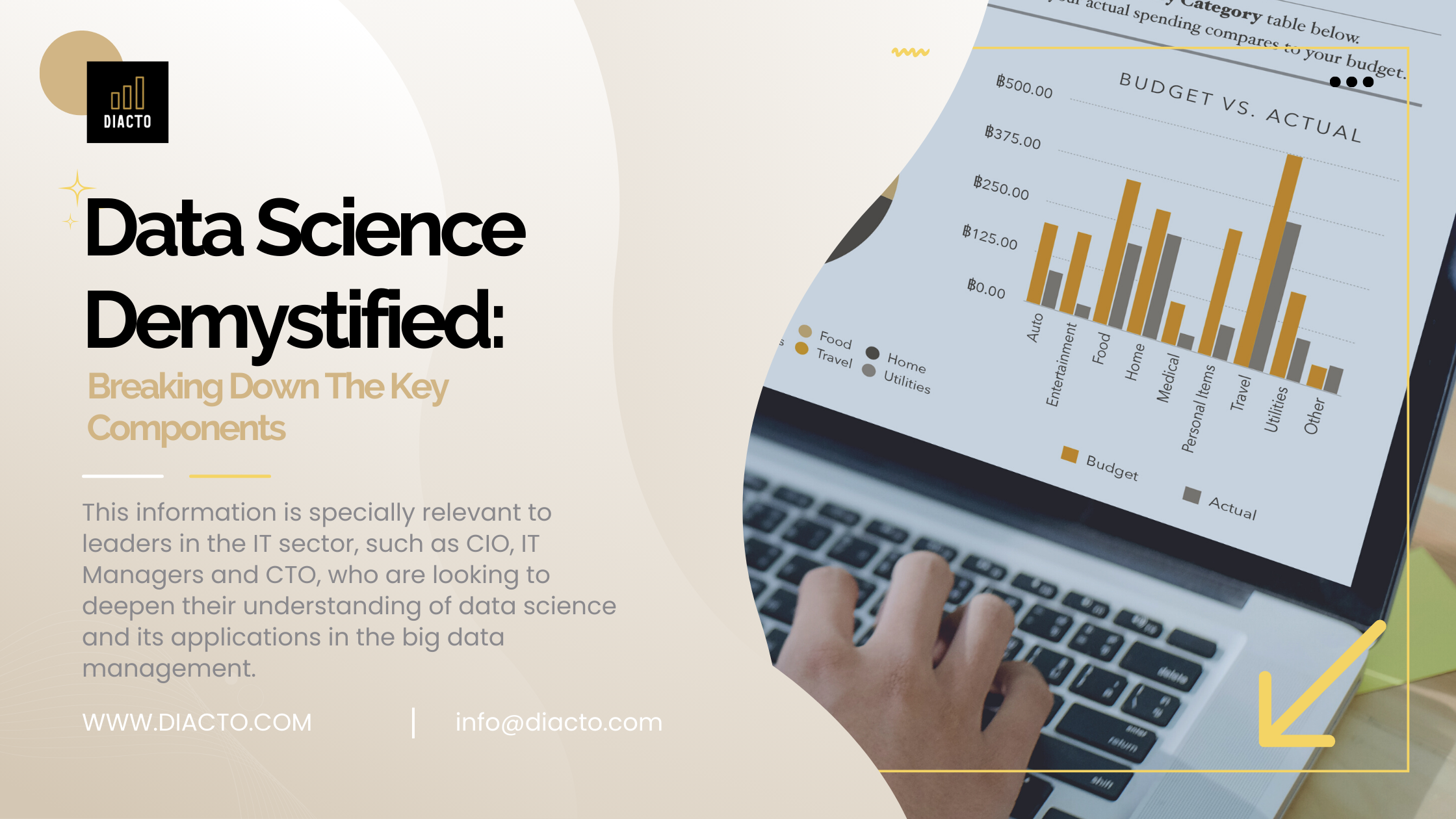
Data science, a field that blends statistical analysis, programming, and domain expertise, has rapidly become a cornerstone in the modern business landscape.
We’ll explore the essential components of data science, focusing on its key elements and how they contribute to successful projects.
This information is especially relevant for leaders in the IT sector, such as Chief Information Officers, IT Managers, and Chief Technology Officers, who are looking to deepen their understanding of data science and its applications in big data management.
Whether you are a seasoned data scientist or a leader looking to deepen your team’s capabilities, this article provides valuable insights and practical knowledge to navigate the complex landscape of data science.

Data is the foundation of data science. It can be structured, such as numerical data in databases, or unstructured, like text, images, and videos. The ability to collect, store, and manage these data types is crucial. Data scientists use various tools and techniques to process raw data, turning it into meaningful insights.
Data visualization is a powerful tool for understanding complex data. It involves creating visual representations, such as graphs and charts, to help communicate data insights clearly and effectively. This is vital in enabling decision-makers to grasp complicated concepts or identify new patterns.
Statistics is the backbone of data science. It involves collecting, analyzing, interpreting, and presenting data. Data scientists use statistical methods for data analysis and make predictions and inferences, helping businesses make data-driven decisions.
Programming languages like Python and R are fundamental in data sciences. These languages provide the flexibility and resources needed for data analysis, machine learning, and data visualization.
Python, in particular, is renowned for its simplicity and the extensive libraries available for data science.
Machine learning is a key component of data science, involving algorithms and statistical models that enable computers to perform tasks without explicit instructions. It’s used in a variety of applications, from predictive analytics to fraud detection.
Data engineering involves the design and management of data workflows and pipelines. Data engineers play a crucial role in preparing data for analysis, ensuring data quality, and maintaining data infrastructure. SQL analysis services are commonly used to manage structured data.
Understanding the industry context is vital for data scientists. It allows them to tailor their analysis to specific business needs and provides the necessary insight to make their findings relevant and actionable.

A strong grounding in statistics and mathematics is essential for understanding the algorithms used in data sciences. This knowledge is crucial for data analysis by designing experiments and interpreting results.
Proficiency in programming languages like Python or R is necessary for executing data science projects. These languages provide the tools for data cleaning and analysis, for visualization as well as training data for machine learning algorithms.
Data wrangling involves cleaning and organizing raw data into a usable format. Data preprocessing includes techniques like normalization and feature engineering, which are vital for preparing data in an efficient format for analysis and machine learning models.
Understanding various machine learning algorithms and techniques is a key component of data science. This includes supervised and unsupervised learning, deep learning, and the ability to choose the appropriate algorithm for a particular problem.
Domain knowledge allows data scientists to understand the context and nuances of the data. Effective communication skills are also crucial for explaining complex data insights to non-technical stakeholders, ensuring that the findings are understood and actionable.

Access to relevant and high-quality data is a common challenge in data projects. Data scientists often need to work with incomplete, inconsistent, or noisy data, which can affect the quality of their analyses.
Ensuring that machine learning models are interpretable and transparent is a significant challenge. It’s important for stakeholders to understand how decisions are made by these models.
Bias in data or algorithms can lead to unfair or unethical outcomes. Data scientists must be vigilant in identifying and mitigating bias to ensure fairness in their models.
Scalability is a challenge in data projects, especially when dealing with large volumes of data. Efficient algorithms and robust infrastructure are necessary to handle big data effectively.
Ethical considerations are of paramount importance in the field of data science. Ethical considerations in data science include privacy, security, and responsible use of data. Data scientists must adhere to ethical standards and legal regulations to protect individuals’ privacy and ensure the responsible use of data.

Diacto Technologies, as a world-class Business Intelligence Solution Provider, offers a range of services and expertise in the field of data analytics.
From advanced computing and big data solutions to machine learning and predictive analytics, Diacto empowers businesses to leverage the full potential of their data.
Visit Diacto’s website to learn more about how their services can transform your data analytics capabilities.
This comprehensive guide to the key components of data sciences and the challenges associated with data science projects provides valuable insights for IT leaders.
By understanding these components and addressing the ethical considerations, organizations can effectively harness the power of data science to drive business intelligence and informed decision-making.